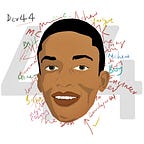00 Computers, Programming, and Programming Languages? | Learn Python like ABC
A complete Python tutorial for anyone who doesn’t know anything about programming.
So what’s this about? 👀
In this series, I want to teach you programming like you don’t know anything about it. I want to consider that you, the person reading this, are an absolute beginner and don’t know anything about the word “Programming”.
The only thing you really need to make this series worthwhile is a computer and maybe a good internet connection. If we later need to add some things, I’ll definitely let you know. So, without wasting much time, let’s get into it.
We are going to start by considering what programming is.
Yes, this series is about me teaching you python; but in order for us to start, we need to first know what programming is really about.
What is Programming? 💡
Computers were developed back in the 18s. They have evolved massively over the years and seeing them now, you’d think that they are really smart.
In an actual sense, the so-called smart devices we see around are not as smart as you might think.
I like to think of them as dumb servants. Yes, that’s right.
For a computer to really do something, it needs to be instructed. It goes according to some set of rules set down for it.
Programming is basically the act of giving computers the necessary instructions to perform a specific task.
A person who gives these instructions can be referred to as a programmer, developer, or sometimes as a coder.
Personally, I don’t give much attention to the names/titles but you’ll get used to them as time goes.
So basically, programmers give instructions to the computer through the act of programming, cool.
Programming Languages 🤔
Now, the computers are nothing like humans. At least not yet 😅. They can’t possibly just understand our verbal and non-verbal forms of communication. So, obviously, if we have to give them instructions, we will have to find a medium of communication between them and us. That’s where programming languages come in.
Python is a programming language.
Others include JavaScipt (mostly shortened as JS), c++, c#, Java, c, R, etc.
Classification of programming languages 🧐
Now, I’d like us to have a touch on how these programming languages are classified. I’m not really going to talk much about this, that’d probably be another article on its own, but just for you to have a fair idea, I’m going to say something little about it.
The first form of classification that we could consider is high-level and low-level programming languages.
Computers, or machines in general, really only work with currents and voltages. This is eventually thought of as 1s and 0s; 1 presenting a high voltage and 0 representing a low voltage.
So technically, computers only understand 1s and 0s.
Now back to the classification. Low-level programming languages are those that are close to the 1s and 0s in terms of syntax and understanding. And by syntax, I mean the manner in which the language is written.
Based on the above, you can easily guess what the high-level ones will be about. They are much closer to the human language and that’s why most programmers use high-level programming languages.
Python is a high-level programming language.
Another form of classification that can be considered is whether the language is compiled or interpreted.
When the language can be directly converted into the 1s and 0s, it is said to be a compiled language.
For interpreted languages, the interpreter goes through the whole programme, one line at a time.
They all have their advantages and disadvantages.
Don’t worry if you don’t fully get the bases of the classifications. It can be quite tricky to understand. With time, it’ll all make sense.
Later in this series, we’ll be looking at object-oriented programming. Object-oriented programming is basically a way of incorporating the concept and features of real-life things into programming.
Python is both object-oriented and interpreted.
But who’s saying all this to you? 😂
Okay okay, I think you’ve had enough of the introduction.
Who am I?
Well, my name is Paul, popularly known as trevenue44
I like to consider myself as the tech boy who wants to do everything.
I started python back in 2019 and no, the start wasn’t that straightforward 😂. But I was able to find my way through.
Today, I’m here to help you do the same. Feel free, call yourself a python programmer, a Pythonista, a pythonieer even, because that’s who you’re going to become after this series.
That’s it
All right, we’re done for this one.
If you like this content and would like to support, you can do that by simply leaving a LIKE behind.
If you want to become my friend, connect with me on twitter. The handle is trevenue44.
A video version of this article is on my YouTube channel. Check that out: trevenue44 on YouTube.
And oh, don’t ask me about the 44 😂.
